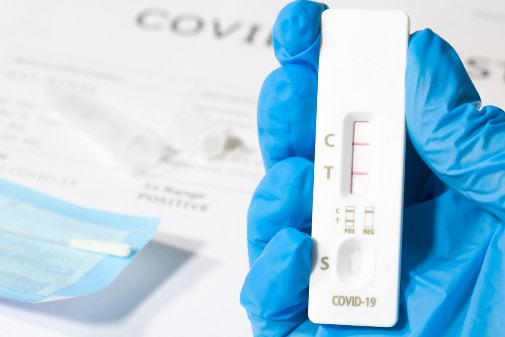Long Covid in women may be linked to inflammation levels at peak of infection, new research suggests
Posted on 6 November 2023
 The research examined the cases of 144 Covid survivors
The research examined the cases of 144 Covid survivors
The study, carried out by clinical researchers at the University of York, Hull York Medical school (HYMS) and the Hull University Teaching Hospital NHS Trust, found that women who survived severe Covid in the first wave of infection in 2019 were more likely to experience the muscle ache, low mood and anxiety that characterises Long Covid if their blood showed signs of inflammation while they battled the disease.
The research examined the cases of 144 Covid survivors, to explore possible pathways for further research into potential drivers of persisting symptoms in Long Covid. A significant number of the survivors were experiencing lingering symptoms, including fatigue (54.2%), breathlessness (52.8%), and sleep disturbance (37.5%) three months post-recovery.
Blood samples
The researchers looked at blood samples taken from the patients at the peak of their Covid-19 infection. They found that for many of the patients with lingering symptoms, and particularly the women, the samples showed elevated biomarkers indicating inflammation activity in the body, including Interleukin-6, C-reactive protein, troponin-T, and ferritin.
Scientists have been working to unravel the complexities of Long Covid since the first reports of the condition began to emerge shortly after the initial wave of the pandemic in early 2020. This observation sheds new light on the long-term effects of the virus by suggesting a potential link between inflammation and persistent symptoms in women, the researchers say.
Urgent need
Co-author of the study Christina van der Feltz-Cornelis, Professor of psychiatry and epidemiology at the Department of Health Sciences and Hull York Medical School, University of York, said: “The findings of this explorative study align with other research showing elevated inflammatory biomarkers in mood disorders, anxiety disorders and fibromyalgia.
"Further research is needed to confirm these findings. The gender aspect is a relevant finding for clinical interpretation. It shows there is an urgent need for large research studies exploring gender-specific aspects of low-grade inflammation in Long COVID and in mental health conditions.”
Mixed condition
Co-author of the study Dominic Sykes, respiratory physician and Academic Clinical Fellow at HYMS, the University of Hull, added: “These findings show how Long Covid can be a mixed condition with physical and mental health symptoms, and how inflammation in the acute phase may play a role in that.
"We need further research into the role of serum biomarkers to be able to predict the long-term prognosis in patients who had Covid-19 infection.”
Potential benefits
Mike Crooks, Professor in respiratory medicine at HYMS, Hull University, said: “This study is a hypothesis-generating study to inform further research into persistent symptoms in Long Covid.
"It provides evidence of the potential benefits of an acute phase assessment of biomarkers to predict outcomes following acute Covid-19, which warrants further investigation. The close alignment of clinical care and research is essential to support evidence-based practice going forward.”
Further information:
The research team included a HYMS INSPIRE medical student. Inspire is a national programme coordinated by the Academy of Medical Sciences and funded by the Wellcome Trust to encourage medical students to get involved in research.
Explore more news

Sodium channels in breast cancer cells a promising target for future treatments, study reveals
Thursday 25 July 2024

Cooling the classroom: University of York researchers to investigate UK schools’ responses to hot weather
Wednesday 24 July 2024

Hunter-gatherers kept an 'orderly home' in the earliest known British dwelling, study shows
Tuesday 23 July 2024

Study uses Game of Thrones to advance understanding of face blindness
Tuesday 23 July 2024

York academic contributes to new report on men’s health which reveals disparities between most and least deprived areas in the UK
Wednesday 17 July 2024
Media enquiries
About this research
The findings have been published in Immunity, Inflammation and Disease.
